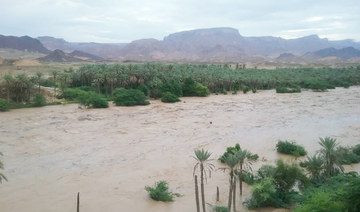AL-MUKALLA: Four internally displaced people were killed and many others were injured on Sunday in Yemen’s central province of Marib when torrential rains and high winds pounded their tents.
The four deaths take to 61 the toll in Yemen reported by the UN since late July.
The internationally recognized government’s executive unit for internally displaced camps in Marib told Arab News of the deaths, injuries and mayhem the weather caused.
Residents tweeted images and videos of shattered houses, improvised shelters, and electricity towers at the Jaw Al-Naseem camp in Marib, where parts of the camp were almost flattened by high winds.
Marib has taken in more than two million displaced people fleeing the war and Houthi brutality in their areas.
The UN Office for the Coordination of Humanitarian Affairs said on Sunday that severe rains and floods had affected 34,260 homes in Yemen, causing extensive damage and killing 57 people and injuring 16, with the figure expected to rise.
According to the UN humanitarian agency’s update on flash flooding in Yemen, between July 28 and Aug. 9, 31 people died and 6,042 families were affected in Yemen’s western province of Hodeidah, 2,753 families were affected in the northern province of Hajjah, and two deaths and 3,451 affected families were reported in the northern province of Saada. In Taiz, a southern province, 15 people were killed, and 6,494 households were affected.
Last week, at least 30 people were killed and others left homeless when severe rains and catastrophic floods devastated Hodeidah, destroying houses, farmland and other property.
Yemen’s National Center of Meteorology on Sunday reaffirmed its warnings to Yemenis throughout the country against driving into or staying in watercourses, forecasting heavy rainfall, floods and strong winds in Yemen’s highlands, and western and southern regions.
At the same time, the Yemeni government on Sunday reiterated its call to the international community to assist the country’s thousands of flood victims, unblock highways, and restore services in four Yemeni provinces.
Rashad Al-Alimi, chairman of Yemen’s Presidential Leadership Council, said at a meeting with Steven H. Fagin, the US ambassador to Yemen, that the country needs immediate humanitarian help to deal with the damage caused by floods and raids in the provinces of Hajjah, Hodeidah, Taiz and Marib.
Meanwhile, local tribesmen persuaded the Houthis to cease their siege and stop invading a village in the province of Al-Bayda after the inhabitants agreed to hand over seven people suspected of murdering local Houthi agents.
During the previous several days, the Houthis surrounded Hamat Sarar in the Walad Rabi area of Al-Bayda and threatened to attack it with tanks after accusing locals of hiding four people suspected of murdering four of the militant group’s members.
Residents, however, said that the Houthis were killed in skirmishes with villagers when fighters at a Houthi-manned checkpoint killed a villager.
According to Nasser Ali Al-Sanae, a Yemeni activist from Al-Bayda, the villagers decided to give up some locals to tribal mediation and hold a modest protest to show their support for the Houthis in return for the Houthis ceasing their onslaught on the village.
“People knew that the Houthis’ retaliation would be terrible, so they decided to arrange the gathering and give up some villagers to halt the bloodshed,” Al-Sanae said.
This happened as Yemeni government authorities, as well as local and international NGOs, warned of “carnage” if the Houthis attacked the village, as the Yemeni militia gathered soldiers and tanks and flew drones above it in preparation for the attack.
“SAM Organization calls on the Houthi group to immediately lift its siege of Hamat Sarar and cease the intimidation and repression policies it has practiced against civilians in its controlled areas for the past ten years,” the Geneva-based SAM Organization for Rights and Liberties said in a statement on Sunday.




























